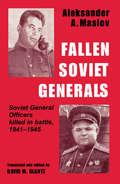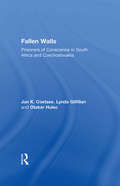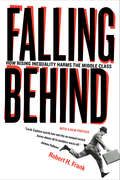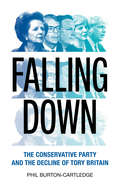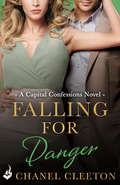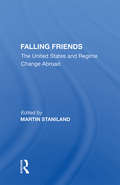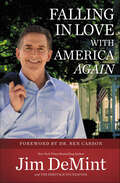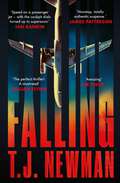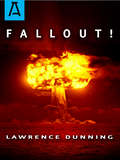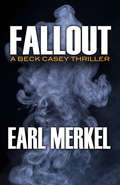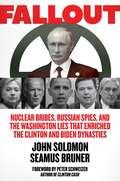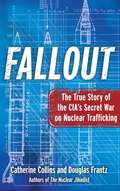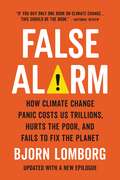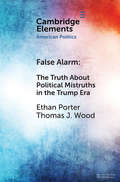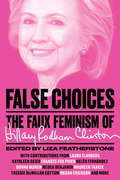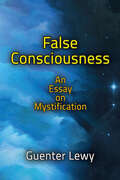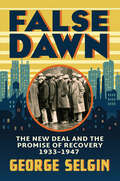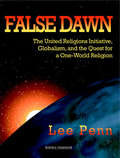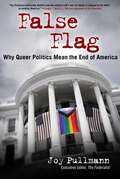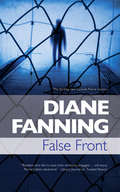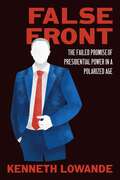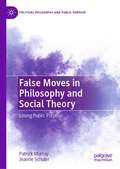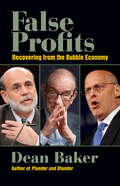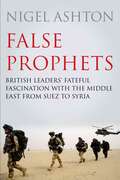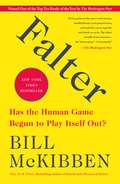- Table View
- List View
Fallen Soviet Generals: Soviet General Officers Killed in Battle, 1941-1945 (Soviet (russian) Military Institutions Ser.)
by Aleksander A. MaslovNo war has caused greater human suffering than the Second World War on Germany's Eastern Front. Victory in the war cost the Red Army over 29 million casualties, whose collective fate is only now being properly documented. Among the many millions of soldiers who made up that gruesome toll were an unprecedented number of Red Army general officers. Many of these perished on the battlefield or in prison camps at the hands of their German tormentors. Others fell victim to equally terrifying Stalinist repression. Together these generals personify the faceless nature of the war of the Eastern Front - the legions of forgotten souls who perished in the war. Covered up for decades, the saga of these victims of war can now be told and in this volume, A A Maslov begins the difficult process of memorializing these warrior casualties. Using formerly secret Soviet archival materials and personal interviews with the families of the officers, he painstakingly documents the fate of Red Army generals who fell victim to wartime enemy action.
Fallen Walls: Prisoners of Conscience in South Africa and Czechoslovakia
by Václav Havel Jan K. Coetzee Lynda Gilfillan Otakar Hulec"This collection of prison writings straddles two continents, and compares and contrasts the political struggles that gave birth to two vibrant new democracies of the twenty-first century: South Africa and the Czech Republic. The triumph over decades of suffering endured by the ordinary citizens of these two countries is symbolized by their leaders, Nelson Mandela and Vaclav Havel.While the moral stature of these two men continues to act as a beacon for other political aspirants in a new century, they call upon us all to acknowledge the role played by ordinary men and women in effecting freedom and justice. For this reason, Fallen Walls focuses on the experiences of ordinary prisoners of conscience. It records three voices from the apartheid-era cells of Robben Island--Joseph Mati, Johnson Mgabela, Monde Mkunqwana--and three voices from communist-era prisons in Czechoslovakia--Jiri Mesicki, Lola Skodova, and Jiri Stransky. There are striking similarities as well as differences between the two sets of stories. On a personal level, the tales from Robben Island are characterized by an absence of bitterness and thoughts of revenge, while a sense of bleak isolation and lingering bitterness pervades accounts from the Czechoslovakian prisons and labor camps. The buoyant tone of triumph of the South Africans is balanced by the darker, more skeptical mood of the Czechs. In an age that teeters so precariously between hope and despair, the narratives of these six prisoners of conscience remind us not only of what we are, but also of what we may become.In a timely warning against complacency, Vaclav Havel notes in his foreword that ""the authors remind us anew of the price that is so often paid for freedom and democracy."" Fallen Walls will be of interest to historians, sociologists, human rights activists, and political scientists."
Falling Behind
by Robert FrankAlthough middle-income families don't earn much more than they did several decades ago, they are buying bigger cars, houses, and appliances. To pay for them, they spend more than they earn and carry record levels of debt. In a book that explores the very meaning of happiness and prosperity in America today, Robert Frank explains how increased concentrations of income and wealth at the top of the economic pyramid have set off "expenditure cascades" that raise the cost of achieving many basic goals for the middle class. Writing in lively prose for a general audience, Frank employs up-to-date economic data and examples drawn from everyday life to shed light on reigning models of consumer behavior. He also suggests reforms that could mitigate the costs of inequality. Falling Behind compels us to rethink how and why we live our economic lives the way we do. Copub: Russell Sage Foundation
Falling Down: The Conservative Party and the Decline of Tory Britain
by Phil Burton-CartledgeThe Fall of the Tory PartyDespite winning the December 2019 General Election, the Conservative parliamentary party is a moribund organisation. It no longer speaks for, or to, the British people. Its leadership has sacrificed the long-standing commitment to the Union to 'Get Brexit Done'. And beyond this, it is an intellectual vacuum, propped up by half-baked doctrine and magical thinking. Falling Down offers an explanation for how the Tory party came to position itself on the edge of the precipice and offers a series of answers to a question seldom addressed: as the party is poised to press the self-destruct button, what kind of role and future can it have?This tipping point has been a long time coming and Burton-Cartledge offers critical analysis to this narrative. Since the era of Thatcherism, the Tories have struggled to find a popular vision for the United Kingdom. At the same time, their members have become increasingly old. Their values have not been adopted by the younger voters. The coalition between the countryside and the City interests is under pressure, and the latter is split by Brexit. The Tories are locked into a declinist spiral, and with their voters not replacing themselves the party is more dependent on a split opposition - putting into question their continued viability as the favoured vehicle of British capital.
Falling For Danger: Capital Confessions 3 (Capital Confessions #3)
by Chanel CleetonFrom the author of Next Year In Havana, a Reese Witherspoon's Book Club pick!Calling fans of Scandal, House of Cards, Kristen Proby and Lauren Layne - prepare to be addicted to the Capital Confessions world of love stories, seduction, secrets and lies...Welcome to Washington, D.C., city of scandal, where no secret stays hidden for long... Four years ago Kate Reynolds' fiancé died on a Special Forces mission in Afghanistan. Ever since she's been consumed with uncovering the truth, vowing to prove his death was no accident. The daughter of a notoriously high-profile senator, her new job as a CIA political analyst is a dream come true, and the chance to avenge the man she loved and lost. Soon Kate's on the brink of discovering what happened that fateful night. Her own life is now in danger and she's stunned by the man who comes to her rescue. Together they must fight to stay alive as they're dragged into a corrupt world of secrets and lies. When the threat hits terrifyingly close to home, will Kate choose vengeance, or the man who has ignited a fire inside her she thought would never burn again? Want more sizzling chemistry and scandalous action? Don't miss Books One and Two in the Capital Confessions series, Flirting With Scandal and Playing With Trouble.
Falling Friends: The United States And Regime Change Abroad
by Martin StanilandFor U.S. policymakers, the collapse of governments headed by "good friends of the United States" has been, over the past thirty years, a repeated cause of alarm and embarrassment. Such crises of succession have implications not only for U.S. foreign policy but also for recent and forthcoming changes in Eastern Europe and the Soviet Union. Martin Staniland draws together extended case studies illustrating regime change and shows how each crisis resembles the others in its phases of development—from the status quo to the "attack" phase and, ultimately, to negotiating the succession. In the process, students get to know the history, culture, and personalities involved from Batista and Eisenhower to Marcos and the Reagan administration. As in every volume in the Case Studies in International Affairs series, this volume opens with an introduction that taps into current theoretical debates in international relations while giving students a framework for understanding and comparing the cases that follow. Individual introductions to each case place the study in context, and discussion questions and exercises are strategically interjected throughout to encourage students to explore the issues and to assess the choices facing policymakers.
Falling in Love with America Again
by Jim DeMintServing within the supposed pinnacles of power as a respected and influential U.S. Senator from South Carolina, Jim DeMint often felt frustrated and powerless to fight against the frightening growth of the federal bureaucracy and refute the mistaken idea that ever-bigger government is the solution to the nation's problems. In his new role as president and CEO of The Heritage Foundation, Jim DeMint has taken on the daunting responsibility of helping to lead Americans themselves to change their country's course, of redirecting us back to our founding principles and restoring and protecting our economy and culture for future generations. He realized that he - and all of us as fellow citizens - must fall in love with America - again.In this book, DeMint illustrates why Americans must rediscover the power, ingenuity and creativity of our little platoons. He then introduces Americans all across the country whose patriotism was nurtured in exactly the same way, recounting example after example of how they're working together locally in what he calls the "little platoons" - the families, churches, communities and voluntary organizations succeeding on the model that smaller is better. They are the hands-on citizens who make America the exceptional, caring and can-do country it has always been.DeMint illustrates why each of us - regardless of political party, age, race, religion or ethnicity - must rediscover the power we represent. The country's future is at risk, not just because of constant pressure from "the Bigs" (big government, big banks, big labor, big Wall Street cronies etc.), but because so many of us fear it's too late to solve problems so huge and seemingly intractable. Jim DeMint is here to reassure us that this is not true.In riveting yet plainspoken style, he tells real-life success stories and educates us via logical, historical and fact-based explanations of the issues (education, taxation, regulation, poverty, labor, health-care, environmentalism, Federalism and more). He affirms the compelling truth that conservative ideas are really American ideas, and they must guide us as we turn our institutions upside-down, taking them from the top-down centrally-controlled bureaucracies they've become back to the bottom-up democratic framework the Constitution intended. Through this heartfelt, fascinating and inspiring look inside the America of both yesterday and today, and the everyday citizens who are working tirelessly and selflessly to insure its future fulfills the promise of its beginnings, Jim DeMint is beckoning us to join him on one of the most meaningful and momentous journeys we have ever undertaken together: FALLING IN LOVE WITH AMERICA AGAIN.
Falling: the most thrilling blockbuster read of the summer
by T. J. NewmanPRE-ORDER THE PAPERBACK EDITION OF DROWNING, THE THRILLING NEW BLOCKBUSTER BY T. J. NEWMAN. OUT JUNE 2024. &‘Amazing . . . Intense suspense, shocks and scares plus chilling insider authenticity make this one very special&’ LEE CHILD 'FALLING is the best kind of thriller (for me as a reader anyway). Characters you care deeply about. Nonstop, totally authentic suspense' JAMES PATTERSON&‘Attention, please: T. J. Newman has written the perfect thriller! GILLIAN FLYNN, #1 bestselling author of Gone GirlYou just boarded a flight to New York.There are one hundred and forty-three other passengers onboard.What you don&’t know is that thirty minutes before the flight your pilot&’s family was kidnapped.For his family to live, everyone on your plane must die.The only way the family will survive is if the pilot follows his orders and crashes the plane. Enjoy the flight. ***Praise for Falling*** &‘Think Speed on a passenger jet - with the cockpit dials turned up to supersonic&’ Ian Rankin &‘Stunning and relentless. This is Jaws at 35,000 feet&’ Don Winslow &‘The best thriller I&’ve read in years. Buckle up&’ Adrian McKinty &‘Attention, please: T. J. Newman has written the perfect thriller! ... Terrific and terrifying, a true page-turner.. A must-read for summer vacation' Gillian Flynn, #1 bestselling author of Gone Girl &‘A jet-propelled thriller that will have you in its grip from first page to last. A truly astonishing debut and an incredible work of pure suspense&’ Steve Cavanagh 'Newman keeps up an extreme pace from the first page—a near-impossible task, considering that the hero is locked in a cockpit, unable to take action himself. This novel is like the films Die Hard and Speed on steroids, creating one of the year&’s best thrillers' Library Journal &‘With characters you&’ll root for and a plot that dips and bounces like a plane hitting turbulence, this thrill ride is impossible to put down&’ Daily Mail &‘A scorching thriller&’ Evening Standard 'Newman&’s [flight attendant] background means Falling brings a freshness and depth to the genre' The Guardian 'A superlative debut . . . This tense, convincing thriller marks the arrival of an assured new talent' Publishers Weekly ' ...full of the kind of authentic detail that comes from personal experience' Literary Review &‘Gripping from the first sentence, this thriller is like no other&’ OK! Magazine 'A remarkable debut' The Sunday Times '... a tense and claustrophobic read, the fast-paced action zipping along at an astonishing rate' Refinery29
Fallout!: A Novel
by Lawrence DunningAndres Kudirka, a once brilliant scientist now headed toward drug-induced insanity, worked on the original A-bomb at Los Alamos and witnessed a test blast in the Pacific where innocent islanders were killed. As chief engineer for Neutron Two, the nation's first commercial fast-breeder reactor nuclear power plant near Denver, Kudirka harbors a deep resentment toward his employers and the United States, and now plans to destroy Neutron Two, unleashing a holocaust that would kill millions of people. Kudirka is troubled by a deep guilt he cannot handle. He has never been able to escape the memory of the "routine test" in the Pacific that annihilated an island. He cannot forget the young girl who came crying out of the devastation of her home, the lone survivor and now his wife, Mariko. Pursuing him is federal investigator Yale Pollack, who is determined to expose Kudirka's past. And Kudirka is desperate enough to stop Pollack using the only means at his disposal-the unimaginable power of a nuclear reactor gone wild close to a major American city housing millions of unsuspecting and unprepared citizens. Can Pollack, or anyone else, stop him in time?
Fallout: A Beck Casey Thriller (The Beck Casey Thrillers #3)
by Earl MerkelWhen DC is leveled by a nuclear attack and the President is assassinated, former CIA op Beck Casey rises from the ashes to bring terrorists to justice . . . “Washington . . . gone.” Ominous words uttered on an Israeli submarine stationed in the Gulf of Oman moments before a torpedo destroys that vessel as well. A nuclear strike has rendered the American capital a radioactive wasteland. But that’s just the beginning of a vast, coordinated terrorist attack. The President falls next. Lone wolf shootings erupt throughout the heartland. Computer viruses take down systems and disable grids across the country. The stakes have never been higher, as former CIA agent Beck Casey joins forces with an international task force to neutralize a seemingly unstoppable enemy. They’ve got three days to save the world . . . or die trying.
Fallout: Nuclear Bribes, Russian Spies, and the Washington Lies that Enriched the Clinton and Biden Dynasties
by John Solomon Seamus BrunerIn 2015, a major story broke exposing Hillary Clinton’s role in approving the sale of an American uranium company to the Russian state nuclear agency, Rosatom. Not only did the sale of Uranium One put 20 percent of America’s domestic uranium supply under the control of Vladimir Putin, there was also evidence that the Clintons themselves had hugely profited from the deal. <p><p> When presidential candidate Donald Trump made Uranium One the centerpiece of his “Crooked Hillary” attacks, the Clinton team feared its potential to damage Hillary’s campaign. Others in the Obama-Biden camp worried that if elected, Trump would expose their role in selling out America’s security to Putin. Their desperate need to neutralize the issue led them to launch an unprecedented investigation into the Trump campaign’s purported ties to Russia. <p> The infamous Steele dossier, produced by Clinton-connected Fusion GPS, sparked an investigation under FBI director James Comey. Instead of ending after the election, the investigation grew bigger, eventually leading to Comey’s firing and the appointment of Special Counsel Robert Mueller. When Mueller failed to find grounds for impeachment, Democrats seized on an ambiguous phone call with the Ukrainian president as a pretext to remove Trump from office. This gambit blew up in their faces when it exposed the secrets that Democrats tried hard to keep buried. <p> An indispensable guide to the hidden background of recent events, Fallout shows how Putin’s bid for nuclear dominance produced a series of political scandals that ultimately posed one of the greatest threats to our democracy in modern American history.
Fallout: The True Story of the CIA's Secret War on Nuclear Trafficking
by Douglas Frantz Catherine CollinsFOR MORE THAN A QUARTER OF A CENTURY, while the Central Intelligence Agency turned a dismissive eye, a globe-straddling network run by Pakistani scientist A. Q. Khan sold the equipment and expertise to make nuclear weapons to a rogues' gallery of nations. Among its known customers were Iran, Libya, and North Korea. When the United States finally took action to stop the network in late 2003, President George W. Bush declared the end of the global enterprise to be a major intelligence victory that had made the world safer. But, as investigative journalists Catherine Collins and Douglas Frantz document masterfully, the claim that Khan's operation had been dismantled was a classic case of too little, too late. Khan's ring had, by then, sold Iran the technology to bring Tehran to the brink of building a nuclear weapon. It had also set loose on the world the most dangerous nuclear secrets imaginable--sophisticated weapons designs, blueprints for uranium enrichment plants, plans for warheads--all for sale to the highest bidder. Relying on explosive new information gathered in exclusive interviews with key participants and previously undisclosed, highly confidential documents, the authors expose the truth behind the elaborate efforts by the CIA to conceal the full extent of the damage done by Khan's network and to cover up how the profound failure to stop the atomic bazaar much earlier jeopardizes our national security today. Fallout takes readers inside the CIA's covert operation to penetrate the Khan network and exposes the agency's desperate and ultimately flawed plans to sabotage the nuclear programs of Iran and Libya. In vivid scenes and convincing detail, the book reveals how the CIA recruited a family of Swiss nuclear traffickers to spy on Khan and help bring down parts of his operation. Collins and Frantz also take readers behind closed doors in the hallowed halls of power in Washington and other world capitals, where they chronicle how the U.S. intelligence agency later enlisted the most senior officials of the Bush administration to protect CIA assets by pressuring the Swiss government to destroy a staggering amount of evidence and derail the planned prosecution of a team of U.S. intelligence agents who violated Swiss laws. More than a high-stakes espionage thriller, Fallout painstakingly examines the huge costs of the CIA's errors and the lost opportunities to halt the spread of nuclear weapons technology long before it was made available to some of the most dangerous and reckless adversaries of the United States and its allies. At its heart, this book stands as a sober warning to citizens and policymakers in the United States and throughout the world. Only sheer luck has allowed us to avoid a nuclear catastrophe so far. If failures like those recounted in Fallout are not remedied, and if fighting nuclear proliferation does not become the number one priority of the world's governments, we will assuredly run out of luck one of these days. *** From FALLOUT In any intelligence operation, the people running it must recognize that there are elements that they do not know. The key to a successful outcome is minimizing the risks associated with those unknowns. In the case of Khan's nuclear ring, the CIA officials knew they would have only one shot at closing down the network. If they missed a major customer or a huge shipment of deadly technology--if some major unknown existed--what they were hoping would be a major intelligence victory could turn into a career-ending embarrassment and yet another in a series of failed missions that had dogged the CIA over the years. Far worse, the failure to identify and stop another country or even a terrorist organization with access to the means to build an atomic weapon would be a colossal risk to international security. It also would contribute to the potential resurgence of the nuclear proliferation ring the CIA hoped to eliminate.
False Alarm: How Climate Change Panic Costs Us Trillions, Hurts the Poor, and Fails to Fix the Planet
by Bjorn LomborgAn &“essential&” (Times UK) and &“meticulously researched&” (Forbes) book by &“the skeptical environmentalist&” argues that panic over climate change is causing more harm than good Hurricanes batter our coasts. Wildfires rage across the American West. Glaciers collapse in the Artic. Politicians, activists, and the media espouse a common message: climate change is destroying the planet, and we must take drastic action immediately to stop it. Children panic about their future, and adults wonder if it is even ethical to bring new life into the world. Enough, argues bestselling author Bjorn Lomborg. Climate change is real, but it's not the apocalyptic threat that we've been told it is. Projections of Earth's imminent demise are based on bad science and even worse economics. In panic, world leaders have committed to wildly expensive but largely ineffective policies that hamper growth and crowd out more pressing investments in human capital, from immunization to education. False Alarm will convince you that everything you think about climate change is wrong -- and points the way toward making the world a vastly better, if slightly warmer, place for us all.
False Alarm: The Truth About Political Mistruths in the Trump Era (Elements in American Politics)
by Thomas J. Wood Ethan PorterAmericans are not invulnerable to factual information. They do not 'backfire'; facts do not make them less accurate. Instead, they become more accurate, even when corrections target co-partisans. Corrections of fake news yield similar results. Among Republicans, Trump's misstatements are less susceptible to corrections than identical misstatements attributed to other Republicans. While we do not observe facts affecting attitudes, multiple instances of misinformation can increase approval of the responsible politician - but corrections can reduce approval by similar amounts. While corrections do not eliminate false beliefs, they reduce the share of inaccurate beliefs among subjects in this study nearly in half.
False Choices: The Faux Feminism of Hillary Rodham Clinton
by Liza FeatherstoneHillary Rodham Clinton is one of the most powerful women in world politics, and the irrational right-wing hatred of Clinton has fed her progressive appeal, helping turn her into a feminist icon. To get a woman in the White House, it's thought, would be an achievement for all women everywhere, a kind of trickle-down feminism. In the run-up to the 2016 presidential election, the mantle of feminist elect has descended on Hillary Clinton, as a thousand viral memes applaud her, and most mainstream feminist leaders, thinkers, and organizations endorse her. In this atmosphere, dissent seems tantamount to political betrayal. In False Choices, an all-star lineup of feminists contests this simplistic reading of the candidate. A detailed look at Hillary Clinton's track record on welfare, Wall Street, criminal justice, education, and war reveals that she has advanced laws and policies that have done real harm to the lives of women and children across the country and the globe. This well-researched collection of essays restores to feminism its revolutionary meaning, and outlines how it could transform the United States and its relation to the world. Includes essays from prominent feminist writers Liza Featherstone, Laura Flanders, Moe Tkacik, Medea Benjamin, Frances Fox Piven and Fred Block, Donna Murch, Kathleen Geier, Yasmin Nair, Megan Erickson, Tressie McMillan Cottom, Catherine Liu, Amber A'Lee Frost, Margaret Corvid, Belén Fernández, Zillah Eisenstein, and others.From the Trade Paperback edition.
False Consciousness: An Essay on Mystification
by Guenter LewyIn this book, Guenter Lewy explains and critiques the idea of false consciousness - that people living under capitalism do not know their best interests. This idea was prevalent in the writings of nineteenth century Marxism, modern communism, and the New Left. Lewy applies what German scholars call Ideologiekritik to the Marxian concept of ideology or false consciousness itself, to demystify the concept of mystification. He also presents an account of the historical development of the concept, and the dangers of its application in society. Belief in false consciousness inspired many social scientists to propose that elite classes in capitalist countries use the media and the education system to manipulate the proletariat, thus perpetuating their own power. Lewy marshals social scientific evidence to refute that idea, demonstrating that education and the mass media in the United States in fact often challenge accepted values and the status quo. Lewy documents Soviet and Chinese brainwashing efforts to eradicate dangerous political ideas and values derived from a belief in false consciousness. He also reviews attempts by Marxist and neo-Marxist educators and social scientists in the Federal Republic of Germany (West Germany) to free young people from false consciousness by means of emancipatory pedagogy--a program of intense political indoctrination.
False Dawn: The New Deal and the Promise of Recovery, 1933–1947 (Markets and Governments in Economic History)
by George SelginA definitive history of the United States’ recovery from the Great Depression—and the New Deal's true part in it. FDR’s New Deal has long enjoyed a special place in American history and policy—both because it redefined the government’s fundamental responsibilities and because Roosevelt’s “bold experimentation” represented a type of policymaking many would like to see repeated. But “the thing about bold experiments,” economist George Selgin reminds us, “is that they often fail.” In False Dawn Selgin draws on both contemporary sources and numerous studies by economic historians to show that, although steps taken during the Roosevelt administration’s first days raised hopes of a speedy recovery from the Great Depression, instead of fulfilling those hopes, subsequent New Deal policies proved so counterproductive that over seventeen percent of American workers—more than the peak unemployment rate during the COVID-19 crisis—were still either unemployed or on work relief six years later. By distinguishing the New Deal’s successes from its failures, and explaining how the U.S. finally managed to lay the specter of mass unemployment to rest, Selgin draws salient lessons for dealing with future recessions.
False Dawn: The United Religions Initiative, Globalism, and the Quest for a One-World Religion
by Charles Upton Mark Christensen Lee PennAn interfaith religious movement, the United Religions Initiative (URI), is rising worldwide. This movement's stated aims are peace among religions, and creation of "cultures of peace, justice and healing" for all. In a time of wars between Islamic nations and the West, such an organization's appeal is easy to understand. Nevertheless, the activities and goals of the URI and its allies are tainted by secular messianism, liberal utopianism, and opposition to orthodox monotheism. False Dawn has been written to warn the public against the United Religions Initiative, and against the URI's globalist, utopian allies in the State of the World Forum, the World Economic Forum, the Earth Charter movement, and similar organizations. False Dawn also gives a detailed description of the anti-Christian "spiritual" collectivism proposed by New Age supporters of the URI (including Barbara Marx Hubbard, Robert Muller, and Neale Donald Walsch), and by their spiritual mentors (Helena Blavatsky, Alice A. Bailey, and Teilhard de Chardin). In the URI's own documents, in the writings and speeches of its activists and leaders, and by the alliances it builds, the URI exemplifies liberal globalism. Understanding the URI and its allies therefore sheds light on a worldwide social and political movement that is far more influential than the URI alone. The URI is a case study in a "progressive" globalist pathology that may soon affect us all. There is a corresponding danger from extreme-rightist forms of globalism and religious utopianism, masquerading as a restoration of order and tradition. The final chapter of False Dawn describes this peril as well, and offers a response to it.
False Flag: Why Queer Politics Mean the End of America
by Joy PullmannPride Used to Be a Sin—Now It Is the Flag of Our Occupation. In this shocking new book, Joy Pullmann shows how radical ideologues and sexual revolutionaries captured local schoolboards, major corporations, the Democratic Party, and the federal government. Their goals are remorselessly totalitarian. Their bureaucratic enforcers, without batting an eye, would gladly take away your job, close down your parochial school, and even separate you from your children. America is undergoing nothing less than a regime change. The country we once knew—its history, its Constitution, its Christian morality, its dedication to God-given individual rights—is under relentless attack by our own government, courts, and institutions. And lest we fail to appreciate our subjugation, every year we are forced for an entire month to bend the knee to the rainbow banner of conquest. Despite their enormous power, however, the cultural Marxists and their liberal enablers can still be beaten if Americans recognize what is at stake—before it is too late. Indeed, thousands of intrepid parents, working with conservative governors and legislators, are off to a good start. This essential book provides counterrevolutionaries with a strategy to build on those efforts. With courage, conviction, and faith, patriots can—and must—bring an end to the woke occupation of America. It&’s the only country we have.
False Front (The Lucinda Pierce Mysteries #5)
by Diane FanningA woman is hanging from a balcony in a perfectly composed suicide scene. But her husband doesn&’t buy it . . . and wants Lucinda Pierce to find the killer. Candace Eagleton is dead and although it appears to be a suicide Homicide Lieutenant Lucinda Pierce is convinced it&’s murder and is determined to find the killer. Meanwhile, Charles Rowland gives FBI agent—and Lucinda&’s boyfriend—Jack Lovett vague details linking another murder to someone at the heart of the US government. But before Jake can find out more, Charles bolts—and is killed. When a scrap of paper is found in Charles&’s apartment with a list of names that includes Candace&’s, it&’s clear the two murders are linked—and there may be more to follow . . . This is the fifth book in the critically acclaimed Lucinda Pierce Mysteries by Edgar Award–winning true-crime writer Diane Fanning.
False Front: The Failed Promise of Presidential Power in a Polarized Age (Chicago Studies in American Politics)
by Kenneth LowandeA provocative new perspective on presidential power. Border walls, school bathrooms, student loans, gun control, diversity, abortion, climate change—today, nothing seems out of reach for the president's pen. But after all the press releases, ceremonies, and speeches, shockingly little gets done. The American presidency promises to solve America's problems, but presidents' unilateral solutions are often weak, even empty. Kenneth Lowande argues this is no accident. The US political system is not set up to allow presidents to solve major policy problems, yet it lays these problems at their doorstep, and there is no other elected official better positioned to attract attention by appearing to govern. Like any politician, presidents are strategic actors who seek symbolic wins. They pursue executive actions, even when they know that these will fail, because doing so allows them to put on a compelling show for key constituencies. But these empty presidential actions are not without their costs: they divert energy from effective government—and, over time, undermine public trust. Drawing on thousands of executive actions, news coverage, interviews, and presidential archives, False Front shows that the real root of presidential power is in what presidents can get away with not doing.
False Moves in Philosophy and Social Theory: Losing Public Purpose (Political Philosophy and Public Purpose)
by Patrick Murray Jeanne SchulerThis book considers diverse philosophical topics unified by the identification of false moves commonly found in modern philosophy, mainstream Anglo-American philosophy, and social theory. The authors expose the sources of fundamental problems that recur in philosophy—basic problems with what the authors call "factoring philosophy." Factoring philosophy fails to attend to the phenomenological task of determining when what is distinguishable is separable and when not. Consequently, factoring philosophy makes phenomenological mistakes—false moves—when it treats as separable what is only distinguishable. Analytic philosophy is prone to false moves when it fails to recognize that phenomenology is the necessary complement to analysis. There is nothing wrong with analysis—we might as well give up thinking as give up analysis—and nothing is wrong with the values prized by analytic philosophy. As Hegel observed, “philosophizing requires, above all, that each thought should be grasped in its full precision and that nothing should remain vague and indeterminate.” Ultimately, this book contends that false moves prevail in philosophical analysis and social theory when they neglect their phenomenological foundations.
False Profits: Recovering from the Bubble Economy
by Dean BakerDean Baker, codirector of the Center for Economic and Policy Research recounts the strategies used by the country’s top economic policymakers to conceal their failure to recognize the housing bubble or take steps to rein it in before it grew to unprecedented levels, resulting in the loss of millions of jobs, homes, and the life savings of tens of millions of people. He quashes dire warnings of looming rampant inflation and spiraling debt with solid historic evidence to the contrary—evidence that supports more stimulus, not less. With a dose of optimism, Baker outlines a thoughtful progressive program for rebuilding the economy and reshaping the financial system, including new financial transaction taxes that will reduce or eliminate economic waste while providing stimulus and incentives where and when they are most needed.
False Prophets: British Leaders' Fateful Fascination with the Middle East from Suez to Syria
by Nigel Ashton'Fascinating' Guardian, 'Book of the Day''A truly masterly book... A tour de force that will be read for a very long time.' Peter HennessySelected by the New Statesman as an essential read for 2022Britain shaped the modern Middle East through the lines that it drew in the sand after the First World War and through the League of Nations mandates over the fledgling states that followed. Less than forty years later, the Suez crisis dealt a fatal blow to Britain's standing in the Middle East and is often represented as the final throes of British imperialism. However, as this insightful and compelling new book reveals, successive prime ministers have all sought to extend British influence in the Middle East and their actions have often led to a disastrous outcome.While Anthony Eden and Tony Blair are the two most prominent examples of prime ministers whose reputations have been ruined by their interventions in the region, they were not alone in taking significant risks in deploying British forces to the Middle East. There was an unspoken assumption that Britain could help solve its problems, even if only for the reason that British imperialism had created the problems in the first place.Drawing these threads together, Nigel Ashton explores the reasons why British leaders have been unable to resist returning to the mire of the Middle East, while highlighting the misconceptions about the region that have helped shape their interventions, and the legacy of history that has fuelled their pride and arrogance. Ultimately, he shows how their fears and insecurities made them into false prophets who conjured existential threats out of the sands of the Middle East.
Falter: Has the Human Game Begun to Play Itself Out?
by Bill McKibbenThirty years ago Bill McKibben offered one of the earliest warnings about climate change. Now he broadens the warning: the entire human game, he suggests, has begun to play itself out.Bill McKibben’s groundbreaking book The End of Nature -- issued in dozens of languages and long regarded as a classic -- was the first book to alert us to global warming. But the danger is broader than that: even as climate change shrinks the space where our civilization can exist, new technologies like artificial intelligence and robotics threaten to bleach away the variety of human experience. Falter tells the story of these converging trends and of the ideological fervor that keeps us from bringing them under control. And then, drawing on McKibben’s experience in building 350.org, the first truly global citizens movement to combat climate change, it offers some possible ways out of the trap. We’re at a bleak moment in human history -- and we’ll either confront that bleakness or watch the civilization our forebears built slip away.Falter is a powerful and sobering call to arms, to save not only our planet but also our humanity.
